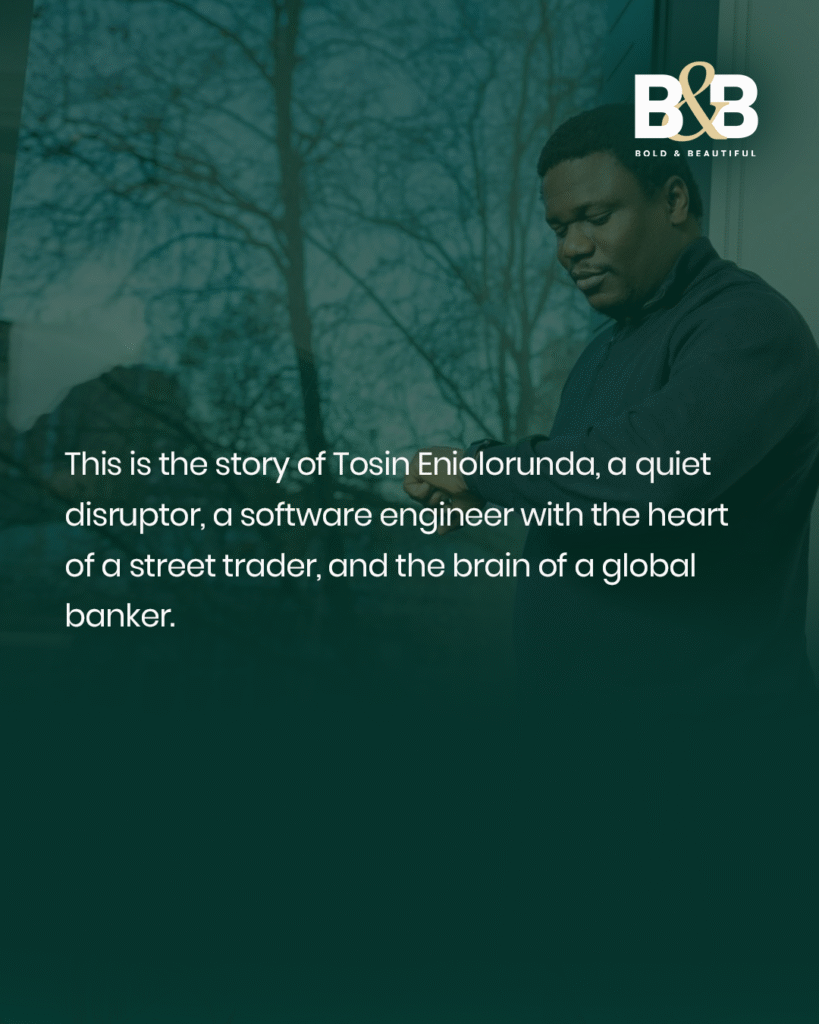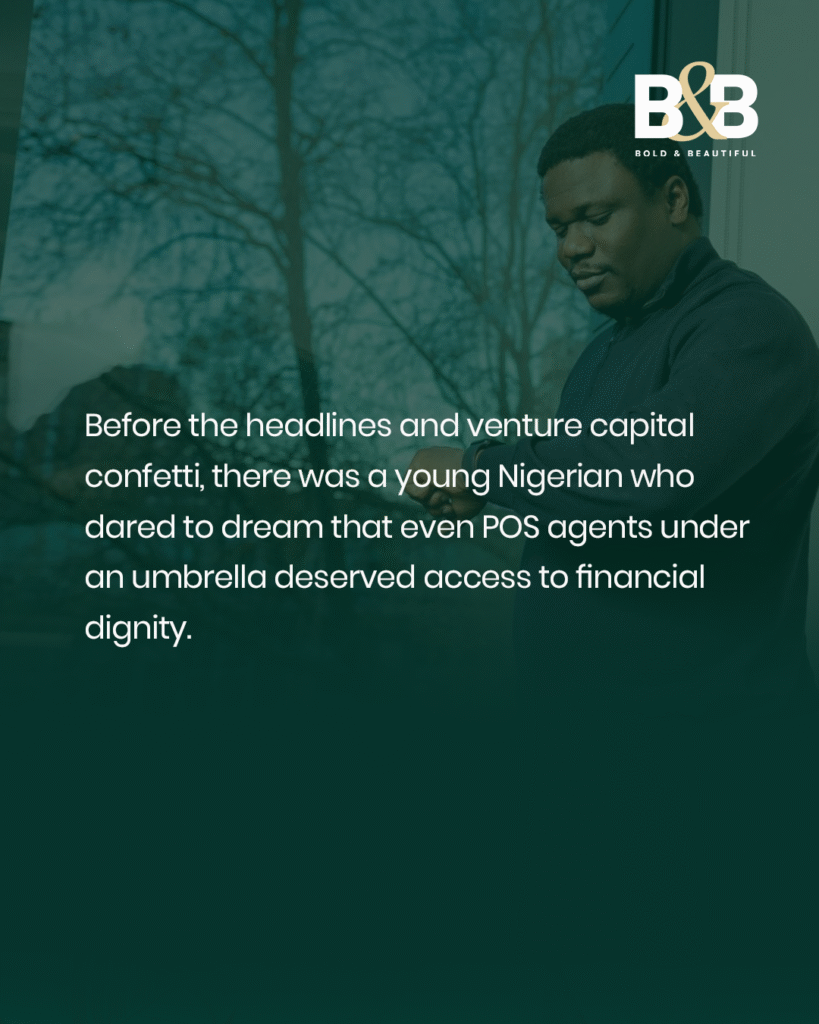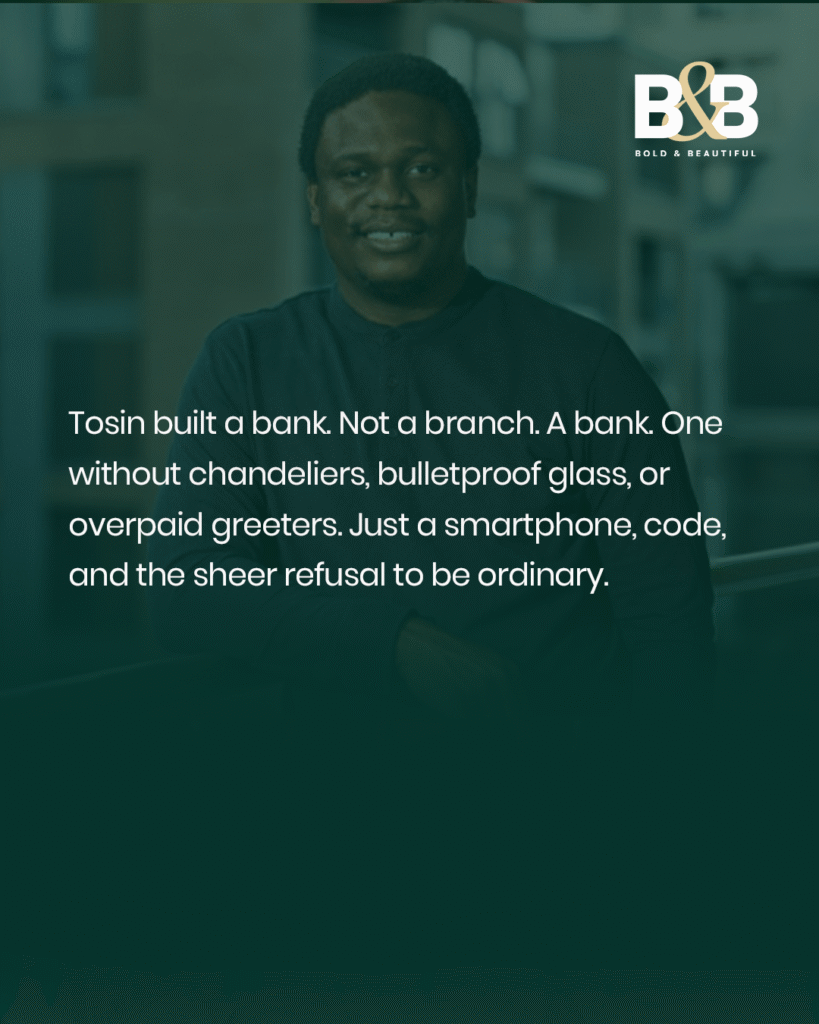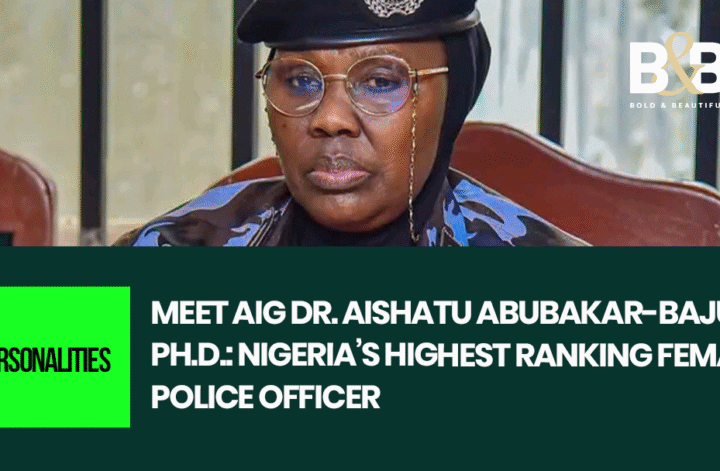If you were born in Nigeria, you probably heard this phrase once or twice growing up: “Better soup, na money kill am.” But what they forgot to add was that it isn’t just money that makes the soup, it’s also vision, grit, and the sheer nerve to stir the pot differently.

This is the story of Tosin Eniolorunda, a quiet disruptor, a software engineer with the heart of a street trader, and the brain of a global banker. In a country where tech success stories often sound like recycled TED Talks with too many buzzwords and too little bite, Tosin built a bank. Not a branch. A bank. One without chandeliers, bulletproof glass, or overpaid greeters. Just a smartphone, code, and the sheer refusal to be ordinary.
Yes, Moniepoint Inc. didn’t just join the fintech race,, it lapped it.
But before the headlines and venture capital confetti, there was a young Nigerian who dared to dream that even POS agents under an umbrella deserved access to financial dignity. While others were writing think pieces about “financial inclusion,” Tosin was writing code. He wasn’t tweeting theories; he was building platforms.
Let’s back up a bit.
The son of a civil servant, Tosin didn’t attend Ivy League schools or come from a legacy of industry titans. His degree wasn’t bought at a dinner party in Banana Island; it was earned the Nigerian way, through mosquito-bitten nights, power outages, and the kind of hustle that would break lesser spirits.
He started his career at Interswitch, the fintech granddaddy. It was there he learned the architecture of Africa’s payment rails. But learning wasn’t enough. Learning is what we all do. Few dare to rebuild. When he left Interswitch in 2015 to start TeamApt, the parent company of what would become Moniepoint – most people assumed it was another tech startup headed for the startup graveyard where pitch decks go to die.
They were wrong.
By 2019, while some startups were busy chasing clout and writing poetic “Dear John” letters to their investors after burn rates exploded, Tosin’s Moniepoint was quietly onboarding the real Nigeria: the kiosk owner in Osogbo, the pharmacy in Onitsha, the food vendor in Kano. No buzz. Just business. No hype. Just impact.
Ask yourself this: When last did you hear of a Nigerian fintech CEO who doesn’t carry a MacBook like a trophy?

Tosin doesn’t pose for the camera. He poses questions, sharp, uncomfortable ones. Like: Why should a woman selling akara in Ijebu wait five days for a bank transfer to reflect? Why should an MSME struggle to get a loan when its revenue data is literally a goldmine waiting to be analyzed?
He built Moniepoint with one stubborn assumption: Every business, no matter how small, deserves banking that works. Not the performative kind. The real thing. And unlike many of his contemporaries, he did not build for validation from Silicon Valley. He built for Alaba, Aba, and Agbor.
By 2023, Moniepoint had processed over $182 billion in transactions, numbers that even some licensed banks couldn’t sneeze at. And in a plot twist worthy of Nollywood, the Central Bank of Nigeria handed Moniepoint a banking license. Yes, an actual microfinance banking license allowing them to operate like a traditional bank. Except, of course, Moniepoint isn’t traditional. It’s digital, from the ground up.
Now here’s the kicker.
In a country obsessed with big men and bigger egos, Tosin remains aggressively lowkey. While some fintech CEOs are cosplaying as motivational speakers, Tosin is in the trenches, tweaking algorithms, simplifying user journeys, and asking himself one deeply uncomfortable question: “What if we stopped building tech for tech bros, and started building it for pepper sellers?”
It’s an uncomfortable question. But it’s also the million-dollar one.
Because here’s the truth, no one wants to say out loud: Innovation in Nigeria isn’t about solving new problems; it’s about solving old problems for people who’ve been ignored. The average Nigerian isn’t looking for Web3. They’re looking for cash that doesn’t disappear into the void. They don’t want blockchain. They want trust.
Tosin Eniolorunda understood this. And that’s why Moniepoint now serves over 1.6 million businesses, processes over 400 million monthly transactions, and employs more than 1,000 staff across Africa.
But beyond the numbers is the narrative.
We live in a country where dreams often die of thirst in boardrooms. Where innovation is sacrificed on the altar of compliance. Where regulation is weaponized, and mediocrity is a networking event. Yet, in the middle of all this, Tosin thrived.
Not because he had political connections. But because he had an obsession: to give power back to the people, financially.
And make no mistake — Moniepoint is not the end of Tosin’s journey. It’s the middle. He is not building a company. He’s rewriting the user manual of what an African bank should look like.
He’s showing the next generation of software engineers that you don’t have to wear suits that don’t fit or talk in borrowed accents to raise capital. You don’t need to relocate to London to be taken seriously. You can build from Lagos and lead from there.

So here’s the question for you, dear reader:
What’s stopping you?
Is it capital? Tosin started with code and conviction. Is it the system? He hacked it. Is it fear? He replaced it with focus.
And maybe that’s what we need more of in Nigeria, less noise, more product. Less validation, more value. Less waiting, more building. Not another fintech chasing Western trends, but African minds designing solutions rooted in our local realities.
Tosin Eniolorunda is not a unicorn chaser. He’s a blueprint drafter. A masterclass in what happens when competence meets courage. When purpose meets product. When software stops being a pitch deck and starts being a revolution.
The Millionaire Blueprint, dear reader, isn’t about millions in your account. It’s about millions of lives you touch. And if you ever doubted whether that’s possible in a country where potential is often crushed under bureaucracy and bad power supply, Tosin has one word for you:
Build.
Because greatness, like banking, no longer needs a building.





